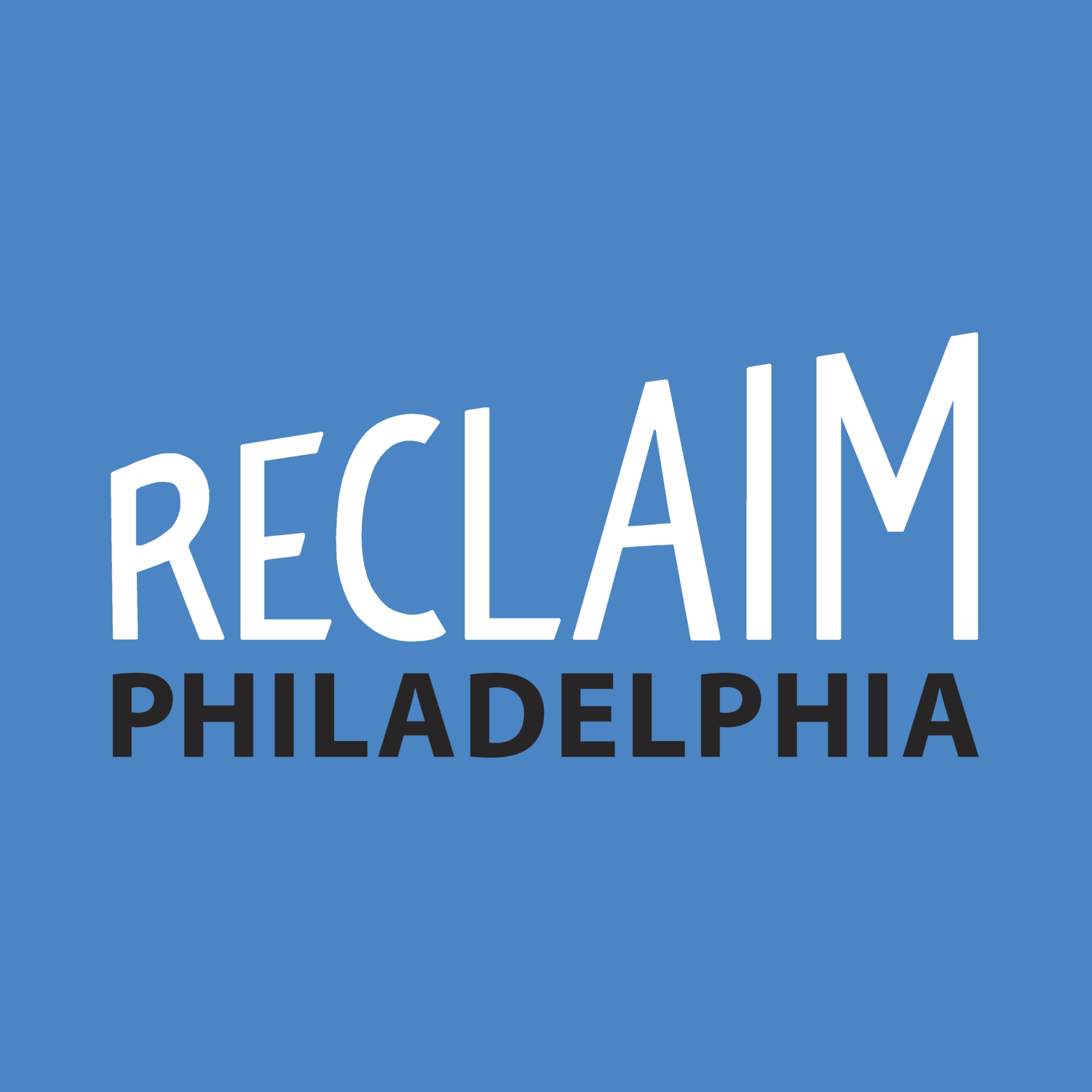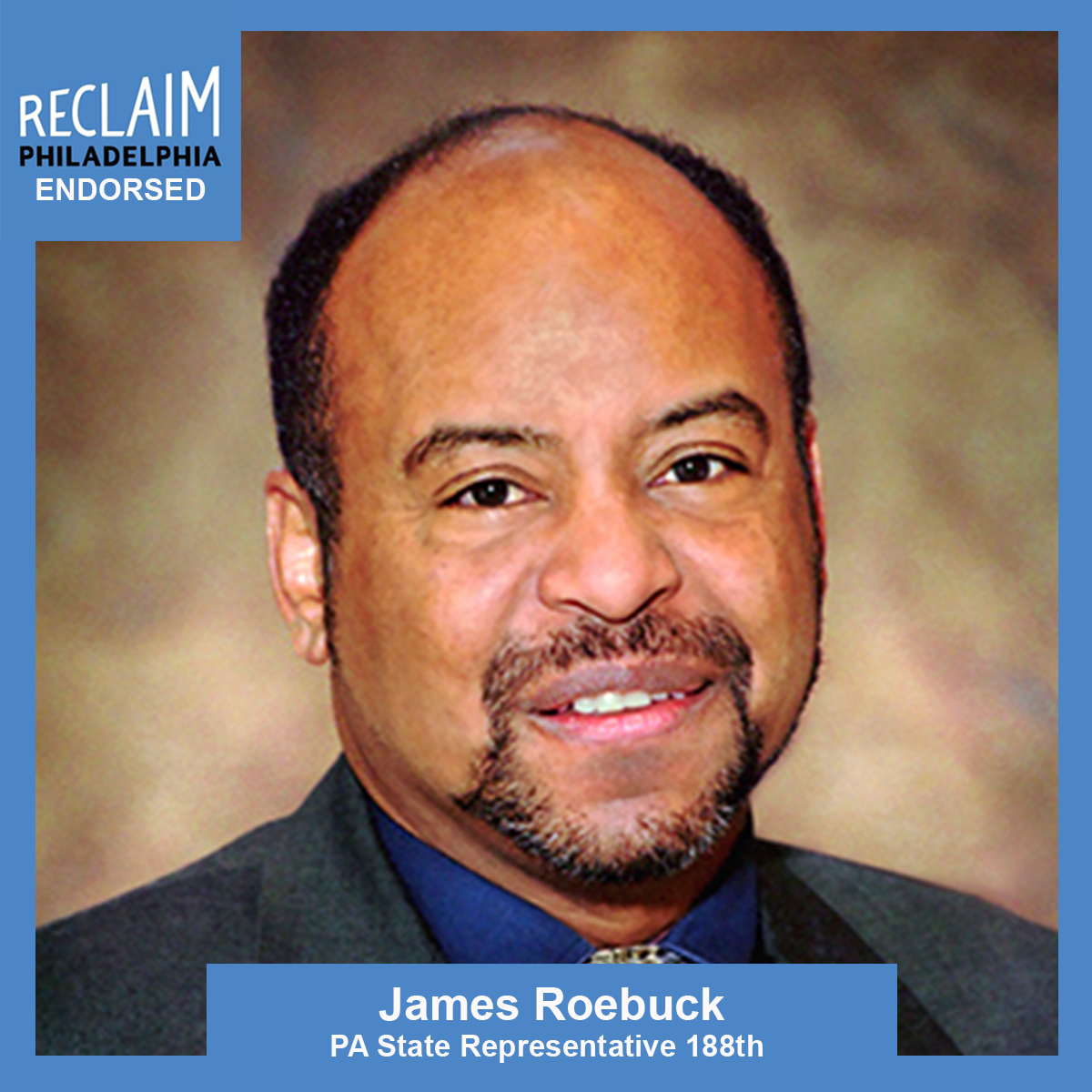James Roebuck Jr.- State Rep in the 188th
Questionnaire Responses by Rep. James Roebuck — Incumbent Candidate for State Rep in the 188th
1. What do you value most about the 188th district and why do you want to represent it in the state legislature?
I have always valued the diversity and tolerance and the accepting attitudes of my constituents as they try to build a sense of common purpose among its residents. This is a good place in which to live and work.
2. How do you plan to incorporate grassroots movements into your campaign, and long-term community organizing and participation into your governance if elected?
I’ve always tried to incorporate grass roots groups in my district. I appreciate their commitment to bringing about change, making government work. I appreciate their enthusiasm, their ideas, their willingness to continue to create a good agenda for action.
3. If you have served as an elected official before, what services have you delivered to residents across your district? If you have never served as an elected official, what services do you want to deliver and how will you do so?
I have a very effective district office, a source of information and support for the residents of the 188th. We are able to address the problems they encounter with government in general and with state government in particular.
We are a source of information and can either provide them with answers or direct them to an agency which can assist them.
On a daily basis, I work with numerous groups at all levels of government to insure they provide services my constituents need and facilitate help they need.
In order to provide support — I make personal contributions — and often become a part of the groups and donate my expertise to help them grow and become stronger.
I am constantly working with educational institutions at all levels, pre-school and up through graduate education — to help solving issues with state problems, helping seniors access rebates for prescription drugs.
Most recently I was able to secure significant funding grants for important nonprofits in our district: the Ronald McDonald House, Community College of Philadelphia, and the Mercy Catholic Medical Center emergency department.
* $1.25 million for the Community College of Philadelphia to help it substantially increase the capacity of its automotive technology program in west Philadelphia to train more students for well-paying jobs in that field. The project also will allow an increased emphasis on the latest alternative fuels technology and a greater ability to provide a qualified technician workforce for large regional fleets.
* $1 million for the Philadelphia Ronald McDonald House’s Chestnut Street expansion project. (Governor Wolf and Mayor Kenney praised my work on securing these grants.) The expansion project includes more than doubling the facility’s size from 45 to 111 bedrooms and will also benefit the surrounding community, creating both construction and long-term jobs and contributing to the ongoing revitalization efforts in the area.
* $500,000 for the Mercy Catholic Medical Center emergency department. The Mercy Ambulatory Clinic plans to renovate existing space to expand the Mercy Philadelphia hospital emergency department. The department plans to expand by 10,000 square feet from 14 to 29 bays by building a second pod of 15 bays — including two isolation bays — while retaining the five fast track bays.
4. What are your budgetary priorities, what revenue sources would you seek, and how will you move these measures through the Republican-dominated legislature?
My budget priority remains funding education so young people have an opportunity and a foundation to build successful lives. I also continue working for seniors and veterans who need state help.
We don’t have clear sources for funding — we need steady, reliable sources for funding education, for example.
5. Philadelphia remains the most impoverished major city and about 75% of our residents lack bachelor’s degrees. What policies would you implement to ensure that decent, high-paying jobs created here are accessible to the majority of our population, not just the relatively well-educated and already well off?
We need to increase the ability of people in Philadelphia to get a good education, which opens the way for them to get good productive jobs. (See answer to question 3 for job creation.)
6. Pennsylvania has the highest average student loan debt of any state, at $35,185. Would you support legislation to make the PASSHE system and Commonwealth colleges tuition and fee free and provide cost of living stipends to low-income students?
Since I serve on the board of PHEAA, PA Higher Education Assistance Agency, I know that we must find a source of revenue to make college free in our state.
7. What policies would you promote to reduce or eliminate Pennsylvania residents’ student loan debt burden?
I would favor providing more money for financial aid for college education We need to find a source of revenue to support school funding.
8. Philadelphia’s school district has been under partial state control since 2001. Do you support maintaining the School Reform Commission? Why or why not?
I have spoken out often and publicly against the SRC and was delighted to see that there will now be a Board of Education put into place. I also introduced legislation to get rid of the SRC. I’m glad to see it is gone.
9. Approximately 33% of Philadelphia students are enrolled in charter schools. What is your position on the expansion of charter schools? Should they be given public money via vouchers or similar programs (like ESAs)? What role do you think public schools play in our city?
Charter schools were created according to a 1997 law which provided they were supposed to be innovative educational institutions which wold delivered education services to students and provide models which could be replicated. Although that law has been in existence for 20 years, there is no systematic evaluation of charter schools and the policies which could be shared with other institutions.
I have been on record for years voicing concerns about the proliferation of charter schools. Yes, some charter schools which I have visited are doing a wonderful job — of educating students and providing a safe environment for them
I do not support vouchers and I think traditional public schools need to be held to a higher level of academic excellence. The curriculum needs to be improved so all students get a foundation on which they can go to college or other post-secondary education that will allow them to pursue careers.
10. What policies would you advocate to expand and strengthen the labor movement in Pennsylvania? How would you fortify existing unions in the event of a state or nationwide right-to-work law? How would you expand worker representation and power in sectors with low union density?
I do not support right-to-work laws. I am a very strong advocate for unions. But unions need to be more inclusive and break down barriers which prevent minorities from entering their ranks.
11. Will you commit to fighting for funding to expand Medically-Assisted Treatment, mental health, and community-based programs to support people struggling with addictions and their families in Philadelphia? How will you hold the pharmaceutical industry accountable for its role in the spread of the opioid crisis?
Yes, we need to have stronger laws to regulate the pharmaceutical industry — probably should come from the federal government instead of individual state governments.
12. Philadelphia’s immigrant and minority communities are threatened by increased ICE deportation efforts, police brutality and misconduct, and discriminatory treatment by our criminal justice system. At the same time, crime has been a significant problem in some parts of the district. What will you do to ensure that Philadelphia is safe and welcoming for all, from all types of violence?
I support a system that treats all persons fairly — I do not believe immigrants should be hassled by police action or police deportation. I strongly support Philadelphia’s remaining a sanctuary city.
13. Do you agree or disagree that “tough on crime” policies have overcrowded our prisons, and if so, what steps would you take to reduce our prison population?
We need to make sure that we provide individuals with a foundation that allows them to have a productive life without resorting to criminal activities to survive. Our whole criminal justice system needs radical reform. Our prison system which seems to be fundamentally corrupt needs that reform.
14. The statewide average annual cost for childcare services is $10,640, while the median assisted living facility and nursing home cost $43,200 and $116,800 per year, respectively. Would you support or oppose legislation to provide universal child and elder care for Pennsylvanians?
I would support both.
15. Would you support legislation for universal single-payer healthcare with no co-pays that covers all individuals regardless of documentation status?
Yes.
16. Do you support the Keystone Opportunity Zone program? Would you introduce legislation to eliminate it, or to limit the number of times a parcel’s KOZ designation can be renewed or extended? More generally, do you support tax breaks to lure or retain businesses?
While I do understand that tax breaks are often an economic stimulus to encourage development of new housing and to lure and retain businesses, I do believe the present system needs tighter control.
17. What is your opinion on privatized infrastructure or public-private partnerships for development or maintenance of public infrastructure like roads or water works?
I think this is an area that needs further study. We need to look at what other states have done in this area and try to find models of success that we might replicate.
18. What, in your view, are the causes, threats, and opportunities of climate change? How would you address climate change as a Pennsylvania state representative?
There are many causes of climate change As a person who supports strong environmental legislation and who has always voted for such, this is the best way to restore a balance in issue of climate and threat of climate change to our society. Many respected scientists warn us of the precarious road we are on — in respect to climate change. We need to heed their warnings and advice.
19. The Philadelphia Chamber of Commerce advocates converting Philadelphia into an “energy hub” for oil and natural gas, or the “Houston of the East Coast.” Do you agree or disagree with this vision? If you or your employer are a member of the Chamber, have you used your influence to advocate in any way on this proposal?
I do not see this as a positive direction for our city to pursue.
20. Do you regard basic needs of Pennsylvanians, including food, housing, healthcare, and education, as human rights or as commodities most efficiently distributed by economic markets?
I see these as human rights.
21. How do you define democracy, and does Pennsylvania meet your definition? Why or why not? What actions if any would you take to alter who makes the most important decisions in our state and society, and whose needs are prioritized?
In my mind democracy is that form of political activity which allows the greatest amount of freedom to individuals, allowing them to voice their opinion. We have some distance to go in making Pennsylvania reach that level of possibility. We need to insure that our democracy is purely representative. We need to tackle the problem of gerrymandering which disproportionately shifts the political power in this state. And we need to make it as easy as possible for Pennsylvanians to vote, and by voting to have their opinions heard.

